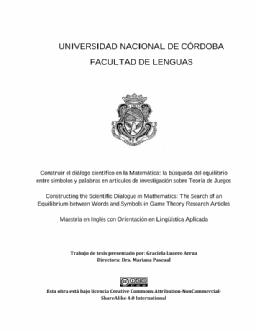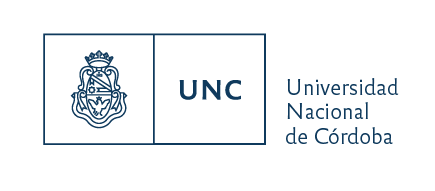Constructing the Scientific Dialogue in Mathematics: The Search of an Equilibrium between Words and Symbols in Game Theory Research Articles

View/
Date
2021Author
Lucero Arrua, Graciela Beatriz
Advisor
Pascual, Mariana
Metadata
Show full item recordAbstract
Most scientific communication is conducted in English, which may be a difficult task and a source of
obstacles for researchers whose primary language is not English (Bitchenera & Basturkmen, 2006;
Borlogan, 2009; Duff, 2010; Matsuda & Matsuda, 2010). As a matter of concern for language scholars, this
situation requires at least two actions: (1) the development of research focused on the problems faced by
researchers when writing in a foreign language, and (2) the design and implementation of pedagogical and
didactic programmes or services aimed at providing researchers with the tools to enhance their linguistic
and rhetorical skills. In both cases, the ultimate objective of these lines of action is to help researchers
integrate into and interact with their knowledge communities in an independent, active and successful way.
Considering those needs and the emerging interest in English as a lingua franca or as an international
language, many scholars have devoted to studying the features of writing and language use across the world
and across disciplines (Hyland, 2004; Matsuda & Matsuda, 2010; Mercado, 2010). However, few have
explored the case of Mathematics (Lemke, 2002; Morgan, 2008; O’Halloran, 2005; Schleppegrell, 2007),
and even fewer have investigated the discourse of scientific research articles (SRA) in this discipline (Graves
& Moghadassi, 2013, 2014). In view of this situation, investigation of the discourse of science in the field of
Mathematics (Game Theory - GT) as used in the Institute of Applied Mathematics (IMASL), at the National
University of San Luis (UNSL), becomes both an answer to local researchers’ needs and an attempt to
contribute to current research in writing, evaluative discourse and use of English as an international language
for the communication of science. Thus, the main objective of this work is to conduct a comparative
description between unpublished GT SRAs written in English by IMASL researchers and published GT
SRAs written in English by international authors, in terms of linguistic features used to build authorship and
authorial stance. The exploration of the genre is made from the perspective of the system of Appraisal
(Hood, 2010; Martin & White, 2005; White, 2000), with the aid of Corpus Linguistics (CL) tools (Cheng,
2012; Meyer, 2002; Tognini-Bonelli, 2001). The results of this research are expected to be useful for the
enhancement of knowledge of language professionals devoted to the teaching of writing as well as
translation, proofreading, editing and reviewing services. A further goal is to lay the foundations for the
production of didactic material which can potentially be incorporated into writing courses or professional
writing, translation, reviewing and proofreading training programmes.
Collections
The following license files are associated with this item:




